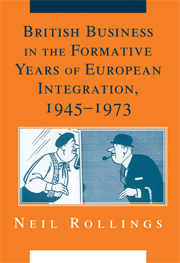Book contents
- Frontmatter
- Contents
- List of Tables and Figure
- Series Editors' Preface
- Acknowledgements
- Abbreviations
- 1 Introduction
- PART I ECONOMIC REALITIES
- PART II THE DEVELOPMENT OF PERCEPTIONS OF EUROPEAN INTEGRATION
- PART III EUROPEAN INTEGRATION AS MORE THAN TARIFFS
- 9 Competition Policy
- 10 Indirect Taxation
- 11 Company Law and the European Company
- Conclusion
- Index
9 - Competition Policy
from PART III - EUROPEAN INTEGRATION AS MORE THAN TARIFFS
Published online by Cambridge University Press: 02 December 2009
- Frontmatter
- Contents
- List of Tables and Figure
- Series Editors' Preface
- Acknowledgements
- Abbreviations
- 1 Introduction
- PART I ECONOMIC REALITIES
- PART II THE DEVELOPMENT OF PERCEPTIONS OF EUROPEAN INTEGRATION
- PART III EUROPEAN INTEGRATION AS MORE THAN TARIFFS
- 9 Competition Policy
- 10 Indirect Taxation
- 11 Company Law and the European Company
- Conclusion
- Index
Summary
British business' attitude to the development of EC competition policy is an illuminating case, not the least because competition policy has always been seen as essential to the success of European integration. In this respect, it provides a key link between market integration and political integration. As McGowan and Wilks have put it, competition policy is “the first supranational policy” in the European Union. Implemented by Directorate General IV of the Commission and the European Court of Justice since its outset, EC competition policy raises issues about sovereignty and regulation, in addition to business attitudes to restrictive practices and competition policy. Despite this, the subject has received little detailed attention by historians of European integration and a number of preconceptions commonly appear in the existing literature. First, EC competition policy is often presented as breaking with traditional European approaches to competition as part of the process of Americanization, with its roots traced back to the 1890 Sherman Act. Secondly, British entry into the EC in 1973 is often presented as a competitive shock for British business, which showed many signs of an anticompetitive bias. Extending this argument, a counterfactual is developed that earlier entry by Britain would have provided an earlier competitive shock, ignoring the possible influence of Britain on the development of EC competition policy and assuming that the markets of the Six were competitive.
- Type
- Chapter
- Information
- Publisher: Cambridge University PressPrint publication year: 2007

